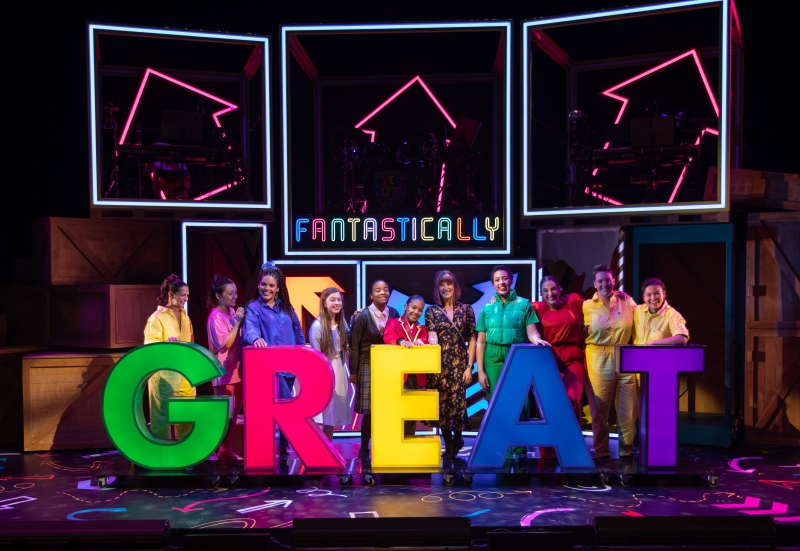Guest Blog: Chris Bush On FANTASTICALLY GREAT WOMEN WHO CHANGED THE WORLD
The playwright on the importance of telling women's stories

I'm writing this from the back of the MAST studios in Southampton, where we're currently in technical rehearsals for Fantastically Great Women Who Changed The World. This will be the fourth and final show I've opened this year, after The Band Plays On in Sheffield, Hungry on tour with Paines Plough, and Kein Weltuntergang (Not the End of the World) at the Schaubühne in Berlin.
Partially through design, partially through happy accident, it marks the end of a year working exclusively with all-female casts (and predominantly female creative teams). These pieces have covered everything from our industrial heritage to food habits and the climate crisis - they haven't been specifically 'women's stories', but they have told their stories through the prism of female experience.
As we get ready to open Fantastically Great Women, I've been thinking a lot about what a 'woman's story' might look like (if indeed there is any such thing), and why that feels so important to me right now to be telling them. On a very simple level it's about representation. It was US activist Marian Wright Edelman who coined the phrase "you can't be what you can't see" - we need role models we can recognise ourselves in, so that we might uncover what we ourselves might be capable of.
 This also means we need women of all shapes and sizes, races and religions, queer women, trans women, disabled women, neurodiverse women, older women, working-class women, to fully represent the breadth of diversity that exists within the UK. This is not to reduce theatre to a box-ticking exercise, but to acknowledge the fundamental power imbalance that exists within the Western canon. We are all shaped by the stories that we're told, and if the heroes of these stories are always straight white men, we start to believe that's what a hero looks like.
This also means we need women of all shapes and sizes, races and religions, queer women, trans women, disabled women, neurodiverse women, older women, working-class women, to fully represent the breadth of diversity that exists within the UK. This is not to reduce theatre to a box-ticking exercise, but to acknowledge the fundamental power imbalance that exists within the Western canon. We are all shaped by the stories that we're told, and if the heroes of these stories are always straight white men, we start to believe that's what a hero looks like.
That said, Fantastically Great Women is by no means just for girls, and the women it features should be equally inspiring to all genders. Furthermore, these women didn't require role models who looked exactly like them, because they themselves were pioneers, ground-breakers, record-setters - they went where nobody had before.
So why is it so important to group them together in one big collective expression of womanly wonder? Other than their brilliance, there isn't an awful lot connecting them. Some of our women, such as Emmeline Pankhurst, are significant specifically because they advanced the causes of women, but most are geniuses whose achievements have nothing to do with gender. Every woman we feature was somehow marginalised, dismissed or held back partially because of their womanhood, but our intent is to celebrate their accomplishments rather than dwell too much on their hardships. So, why does it really matter?
In some ways, this show is proof-positive that the whole notion of a 'woman's story' is complete nonsense. Here we have explorers, athletes, scientists, artists, writers, activists and more - astonishing humans whose gender is the least interesting thing about them. But their existence reminds us that there is nothing a woman cannot do, no space she should ever be kept out of, and that is, apparently, a lesson we still need to learn.
In decades to come, perhaps there will be no need for shows such as this one - perhaps we will have progressed so far along the road to equality that the idea of dividing us on the basis of sex feels quaintly antediluvian. Perhaps....
A month or so ago at a post-show talk in Berlin, a gentleman asked me (with more than a hint of disapproval) why all three characters in my piece were female, seeing as they were all scientists, and scientists are mostly men. In a way, I think his question is the answer to why shows like this one are still needed. Theatre can show us the world as it is, and also the world as we would like it to be, and I would like both my world and my stages populated by fantastically great women.
Fantastically Great Women Who Changed the World is at MAST Mayflower Studios in Southampton until 20 November and then continues on tour - full dates here
Comments

Videos
.png)